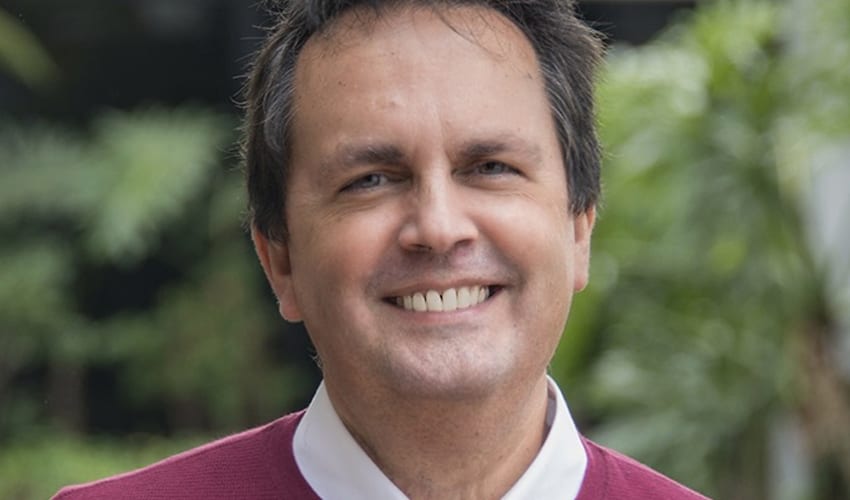“I wonder if I could go to school here.” That was Juan Jaen’s thought as he walked past the University of Michigan’s old chemistry building while visiting from his home city of Madrid (Spain). Anita, his girlfriend at the time, now his wife, replied, “Well, go inside and ask.” So he did. Even though he hadn’t yet finished his undergraduate degree in organic chemistry, that was Juan’s first step towards becoming a Rackham graduate student.
During this impromptu campus visit in 1979, Juan explained that he was in the fourth year of his five-year undergraduate program and knew very little about graduate school. Within an hour, he had completed the forms necessary to take the GRE, discussed funding options, and found out that the four undergraduate years he had already completed would be considered as equivalent to a Bachelor of Science degree by U-M. He was invited to apply and, eight months later, Juan moved to Ann Arbor with $40 in his pocket to begin his graduate school career. What came next set the stage for a successful chemistry career, establishing Dr. Jaen as a leader in the biopharmaceutical industry.
During his time at U-M, Juan says, “The whole environment was fantastic. I’ve never been very focused on planning next steps, and Michigan allowed me to just work on what I enjoyed doing, without agonizing over what I would do with my degree. I was just struck by the fact that I was allowed to go to Michigan and get a Ph.D. from such a great place.”
Juan finished his lab work in 1983, officially completing his Ph.D. in 1984. He continued his work at Parke-Davis/Warner-Lambert on Plymouth Road in Ann Arbor (which eventually became Pfizer shortly after Juan left) where he had been hired as a medicinal chemist during his candidacy. In the Parke-Davis labs, he worked on treatments meant to tackle neurodegenerative disorders, including Alzheimer’s and Parkinson’s diseases, as well as schizophrenia. In 1996, Dr. Terry Rosen, a friend from Juan’s days in the campus lab (an undergrad at the time), convinced Juan to make the move across the country to San Francisco to partner with him as he took the plunge into the biotech world. Their small startup by the name of Tularik focused on regulating the transcription of genes (the process by which genes are read and translated into proteins). Juan built the Chemistry Department of the increasingly successful company, which went public in 1999, grew to more than 400 employees by 2004, and initiated clinical evaluation of multiple drugs. Tularik became Amgen San Francisco in 2004, and Juan served as the Vice President of Chemistry until 2006, when he decided he was better suited for a smaller operation.
Juan went on to spend more than six years as the Chief Scientific Officer of ChemoCentryx, a company focused on discovering drugs to regulate the ability of certain types of cells to move from the blood-stream into tissues that are experiencing inflammation or autoimmune attack. It was after his time there that he decided to reconnect with his old friend and colleague, Dr. Rosen, to form Flexus. Their goal was to identify drugs that could enhance an individual’s immune system to attack cancer cells. With initial funding from both venture capital sources and personal contributions, they grew Flexus to 25 scientists in 15 months and, in April of 2015, they were acquired by Bristol-Myers Squibb, an international biopharmaceutical company, for more than $1 billion. The drug that was developed during Juan’s time there is now in a number of advanced clinical trials, including Phase 3 trials in melanoma and head/neck cancer.
Aided by the profit from the Flexus sale, Arcus Biosciences was born. Its mission is similar but more expansive in scope – stimulate the immune system’s response against cancer. Based in the San Francisco Bay Area, Arcus is primarily made up of chemists and biologists, several of whom have U-M connections, including two new hires with Michigan Ph.D.s. Juan currently serves as the President of the company, which has several molecules in the early stages of clinical trials.
When he looks back on his U-M experience, Juan says he would add just one thing. “Over the last 30 years, I only wish I would have had a more formal medical training,” he said, and he encourages current students, if they are able, to consider degrees in two different areas. He also advises those students currently pursuing advanced degrees, “Focus on the moment, focus on being good at what you enjoy, and don’t agonize too much about what’s around the corner, but if you are compelled to look around the corner, get input from people who have relevant experience.”
That, Juan says, is where fellow alumni can step in. If alumni are looking to support current students, they can do so by providing a real-world context for the analysis of what’s next. “These days, there is much greater intensity on planning but without the context of real-world experience and more based on theoretical knowledge. So many students are going in directions that seem theoretically sound without real-world context. We should be using our experiences to help students make better choices.”
In addition to sharing his experiences, Juan is also a generous donor to the Rackham Graduate School, supporting current and future students pursuing scientific careers in Chemistry. Juan and Anita recently instituted the “Edgardo Laborde Endowed Fund” in honor of their now departed friend and fellow U-M graduate student, in hopes that financial challenges won’t act as a barrier when aspiring graduate students ask themselves, “I wonder if I could go to school here.”

